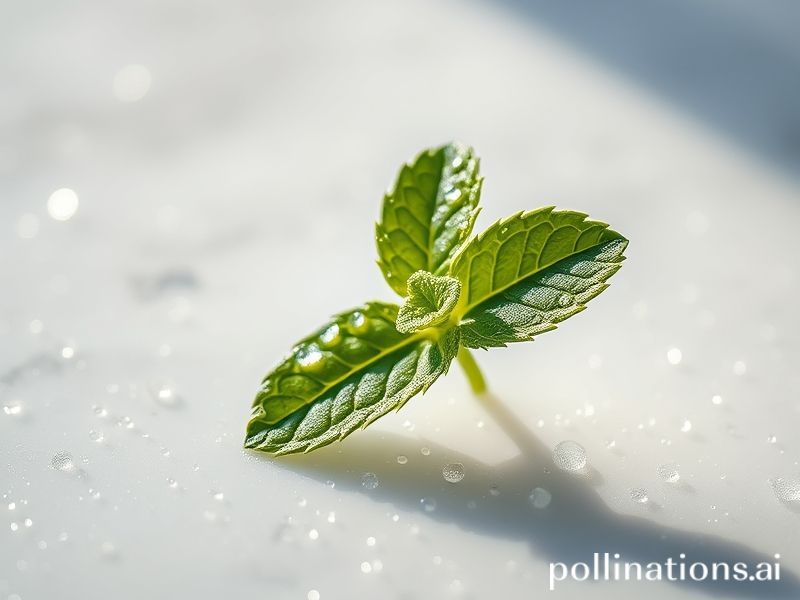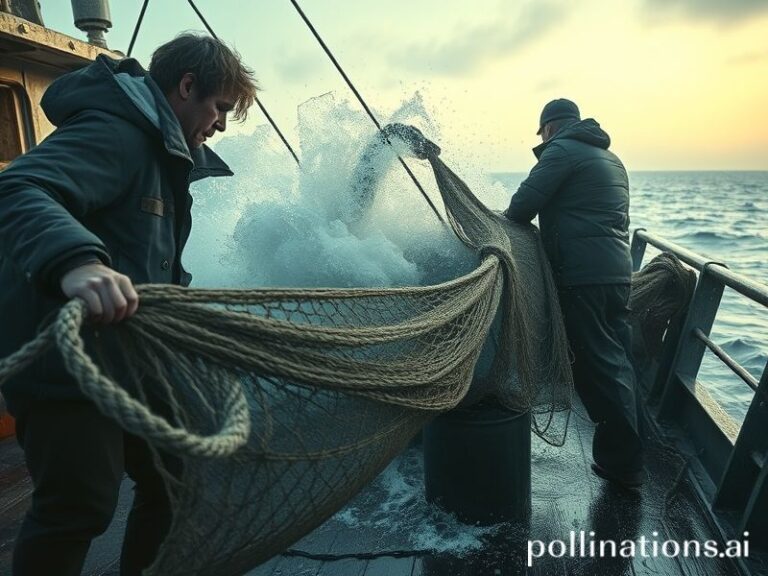Global Freshness Scam: How the World Sells Rot as a Lifestyle Choice
Fresh: The Last Luxury Good Humanity Still Pretends Isn’t Rotting
By Our Correspondent, Somewhere Between the Arctic Cold Chain and a Bangkok Street Cart
PARIS—At 4:47 a.m. on the Rungis wholesale floor, a crate of strawberries is declared “extra-fresh.” The label is printed in seven languages, none of which mention that the berries were harvested in Egypt, hydro-cooled in Turkey, flown over Ukraine on a rerouted cargo jet, and finally misted with a perfume of “natural freshness” patented in Delaware. In 32 hours, they will be photographed on a marble countertop in a 19-square-meter flat whose rent could bankroll a midsize coup in the Sahel. By then, the word “fresh” will have traveled 3,400 kilometers and shed 60 percent of its vitamin C, but gained 400 Instagram likes—a fair trade, apparently.
From the fjords of Norway to the floating markets of the Mekong, “fresh” has become the planet’s most promiscuous adjective, applied to everything from mozzarella to memes. It is the moral fig leaf of late capitalism: if we call it fresh, we can ignore the diesel fumes, the underpaid picker, the child-proof seal that requires a chainsaw. The UN’s Food Systems Summit recently proposed a universal definition: “Fresh: any produce that has not yet visibly surrendered to entropy.” The proposal was tabled after lobbyists from the global plastics caucus argued it would “undermine consumer optimism.”
In wealthier latitudes, freshness is measured in hours; in poorer ones, in seasons. A Norwegian salmon steak is “fresh” if it reaches Tokyo in under 36 hours aboard a flight that emits 2.8 metric tons of CO₂. Meanwhile, a Sudanese farmer considers her millet fresh if the weevils haven’t staged a palace coup by July. The irony is not lost on the millet, which lacks a marketing budget.
The pandemic briefly promised a reset. Locked-down urbanites discovered sourdough starters and called it a return to freshness, conveniently forgetting that the artisanal flour came from industrial monocultures sprayed with fungicides tastefully rebranded as “crop probiotics.” When supply chains spasmed, panic buyers hoarded toilet paper—because nothing says “fresh” like triple-ply aloe-infused reassurance against the apocalypse.
Now the tech bros have arrived with solutions nobody asked for. In Singapore, an Israeli start-up is 3-D printing “fresh” avocados from chickpea protein and algae ink; the CEO claims each unit has “the terroir of a Haas, without the cartels.” In California, venture capitalists are breeding strawberries that glow when they’re optimally fresh—an innovation that will doubtless delight the three consumers who enjoy eating night-lights. Meanwhile, in Lagos, tomatoes still burst in the sun because the power grid can’t keep the fridges humming. The tomatoes have not received seed funding.
Freshness has even infected diplomacy. At last year’s COP climate summit, the Swiss delegation served “carbon-negative fondue” made from dairy cows fed on seaweed. The cheese emitted less methane, but the press release emitted more bullshit. Delegates applauded the symbolism, then flew home in jets fueled by “sustainable aviation spirit,” which is apparently the same kerosene but with a prettier name and a 20 percent surcharge.
And yet, amid the absurdities, a quieter definition persists. In a Havana side street, an old woman sells mangoes from a bicycle basket. They bear small scars, the honest tattoos of rain and time. She hands you one sliced open, its orange flesh weeping juice onto the cracked pavement. It tastes like the morning you first realized the world was beautiful and dangerous in equal measure. No QR code, no blockchain provenance—just the sugar of a tree that hasn’t yet been replaced by condos.
But don’t romanticize her too much; tomorrow she’ll raise the price because the dollar is stronger and her pension buys less rice. Even here, freshness is a moving target, calibrated less by the calendar than by the fragile arithmetic of survival.
So the next time you see “fresh” on a menu, a label, or a politician’s promise, remember: somewhere a plane is circling, a reefer truck is idling, and a poet is trying to describe the taste of a fruit before it, too, becomes a metaphor.







